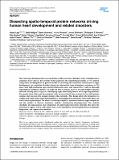Dissecting spatio-temporal protein networks driving human heart development and related disorders
Author(s)
Lage, Kasper; Møllgård, Kjeld; Greenway, Steven; Wakimoto, Hiroko; Gorham, Joshua M.; Workman, Christopher T.; Bendsen, Eske; Hansen, Niclas T.; Rigina, Olga; Roque, Francisco S.; Wiese, Cornelia; Christoffels, Vincent M.; Roberts, Amy E.; Smoot, Leslie B.; Pu, William T.; Donahoe, Patricia; Tommerup, Niels; Brunak, Søren; Seidman, Christine E.; Seidman, Jonathan G.; Larsen, Lars A.; ... Show more Show less
DownloadLage-2010-Dissecting spatio-te.pdf (2.864Mb)
PUBLISHER_CC
Publisher with Creative Commons License
Creative Commons Attribution
Terms of use
Metadata
Show full item recordAbstract
Aberrant organ development is associated with a wide spectrum of disorders, from schizophrenia to congenital heart disease, but systems-level insight into the underlying processes is very limited. Using heart morphogenesis as general model for dissecting the functional architecture of organ development, we combined detailed phenotype information from deleterious mutations in 255 genes with high-confidence experimental interactome data, and coupled the results to thorough experimental validation. Hereby, we made the first systematic analysis of spatio-temporal protein networks driving many stages of a developing organ identifying several novel signaling modules. Our results show that organ development relies on surprisingly few, extensively recycled, protein modules that integrate into complex higher-order networks. This design allows the formation of a complicated organ using simple building blocks, and suggests how mutations in the same genes can lead to diverse phenotypes. We observe a striking temporal correlation between organ complexity and the number of discrete functional modules coordinating morphogenesis. Our analysis elucidates the organization and composition of spatio-temporal protein networks that drive the formation of organs, which in the future may lay the foundation of novel approaches in treatments, diagnostics, and regenerative medicine.
Date issued
2010-06Department
Harvard University--MIT Division of Health Sciences and TechnologyJournal
Molecular Systems Biology
Publisher
Nature Publishing Group / European Molecular Biology Organization (EMBO)
Citation
Lage, Kasper et al. “Dissecting spatio-temporal protein networks driving human heart development and related disorders.” Mol Syst Biol 6 (2010): n. pag. © 2011 Nature Publishing Group
Version: Final published version
ISSN
1744-4292